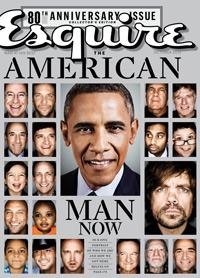Mag Bag: 'Esquire' Unveils Article Pins On Pinterest
- by Erik Sass @eriksass1, September 26, 2013
 'Esquire' Unveils Article Pins On Pinterest
'Esquire' Unveils Article Pins On PinterestMost women’s magazines jumped on the Pinterest train long ago (well, last year), but now men’s magazines are getting in on the act, leveraging the scrapbooking site to reach male Pinterest users, as well as the sizable number of women who read men’s lifestyle magazines.
Hearst Magazine’s Esquire recently launched new, enhanced article pins to make it easier to discover and save the magazine’s online content, extending its longevity and providing more visual components along the way. The new pins pull in more information about the content, allowing users to preview text before clicking. The links never actually “fall off” the page, keeping content accessible for longer.
According to Ross Geisel, Hearst Magazines Digital Media’s director of audience development and social media, Esquire is a natural fit for Pinterest with its focus on categories like style and food, with heavily visual components and a “how to” editorial treatment (e.g., how to tie a bow tie). The new pins can also help increase exposure for less image-driven, more text-focused content, like long-form articles and celebrity profiles.
Earlier this year, some studies estimated that Pinterest’s user base is still 70% female. But that still means there are millions of male users, and the proportion of male users may increase over time. Esquire’s reader base is about 30% female, according to figures from GfK MRI. Geisel observed that “women are going to come to Esquire to figure out what they’re going to buy for their husbands and boyfriends” for birthdays and holidays, perhaps with an eye to spiffing them up a bit.
Condé Nast Traveler Cuts Editorial Staff
Condé Nast Traveler is laying off half of its editorial staff, or 14 employees, including five editors and the entire photo desk and graphics department, according to Bloomberg, which first reported the news. Bloomberg quote spokeswoman Sarina Sanandaji: “This is part of a broader restructuring effort that will shift the focus on more of a lifestyle lens and the growing digital business.” The layoffs follow the appointment of Pilar Guzman as editor in chief last month.
USPS Proposes Rate Increase, Again
The U.S. Postal Service’s financial situation aren’t getting much better, with the public corporation projected to lose $6 billion this year. With Congress blocking a number of proposed reforms (including doing away with a requirement to prefund retirement health benefits), the USPS is once again proposing a rate increase to bring in more revenue, to take effect in January 2014.
Under the proposed plan, the price of first class postage would increase $0.03, or 6.5%, to $0.49 per stamp, while the cost for sending bulk mail, periodicals and packages would increase 5.9%. Mary Berner, the president of MPA – The Association of Magazine Media, said that the rate increases would cost the magazine industry $200 million a year and further predicted that the rate increases, if allowed to take effect, “will cause significant declines in mail volume and further job losses across the industry without addressing the USPS’ core issues.
The consequences of this decision will be felt by the entire mailing industry, the Postal Service, and consumers.” The MPA, along with other members of the Affordable Mail Alliance, has previously stated its support for the broad reforms proposed by the Postmaster General but so far stymied by Congress.
Price To EIC, EatingWell
Meredith Corp. has promoted Jessie Price to the position of editor in chief for EatingWell magazine, where she will be responsible for all the brand’s media platforms, including books and digital extensions. Price joined EatingWell in 2003 and became an assistant food editor in 2004. By 2008, she was promoted to deputy editor of food, responsible for directing all food content, including the magazine, Web site, and cookbooks. Price has also appeared on national and local television shows including "The Today Show," TV Land’s "Best Night In" and "CBS 2 Morning News."
PopularScience.com Nixes Comments
The editors of PopularScience.com, citing the negative effect of trolls, spambots and ad hominem attacks, have decided to stop allowing readers to comment on articles online. While acknowledging that online comments can be informative and valuable, editor Suzanne LaBarre also noted that a “politically motivated, decades-long war on expertise has eroded the popular consensus on a wide variety of scientifically validated topics. Everything, from evolution to the origins of climate change, is mistakenly up for grabs again… And because comments sections tend to be a grotesque reflection of the media culture surrounding them, the cynical work of undermining bedrock scientific doctrine is now being done beneath our own stories, within a web site devoted to championing science.” Readers can still comment on stories via other channels, including Twitter, Facebook, Google+, Pinterest, livechats, and email.


